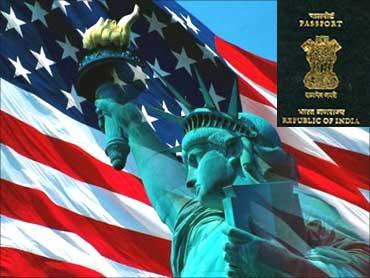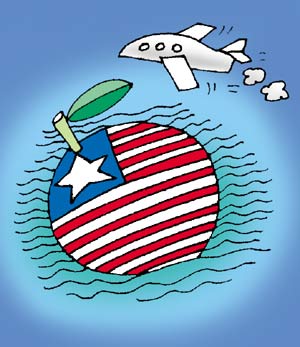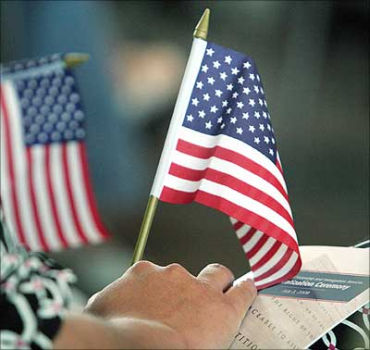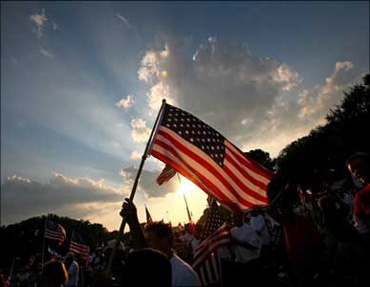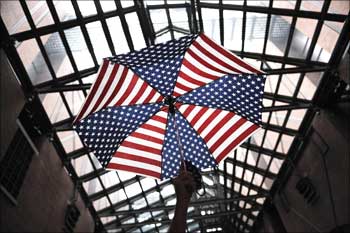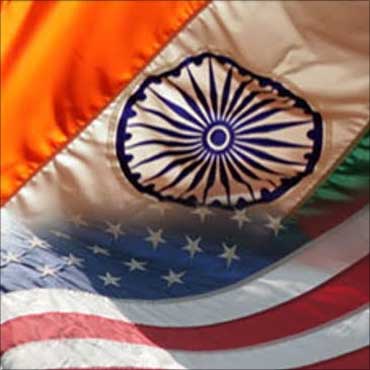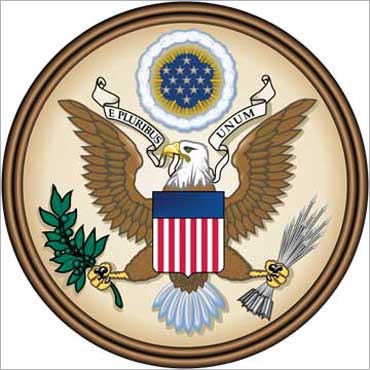 | « Back to article | Print this article |
28% drop in American L-1 visas to Indians
The number of L-1 (intra-company transfer) visas issued at United States consulates in India declined by 28 per cent from 2010 to 2011.
This data was obtained from the US Department of State in a new report by the National Foundation for American Policy, an Arlington, Virginia-based policy research group, which focuses on US immigration policy.
According to the report, the official data from the US State Department show that L-1 visa approvals decreased from 35,896 in 2010 to 25,898 in fiscal year 2011, a drop of approximately 10,000 visas.
Even as L-1 visas issued in India declined by 28 per cent, L-1 visas issued in the rest of the world rose by 15 per cent -- from 38,823 in fiscal year 2010 to 44,820 in 2011.
While the State Department data for 2011 is considered preliminary, the changes in the final data are typically minor.
Click NEXT to read on . . .
28% drop in American L-1 visas to Indians
Increased denials of L-1 visas when attempting to transfer personnel into the United States from India on L-1 visas are having a negative impact on growth, projects and product development in the US, according to companies, the report said.
"The release of the L-1 visa data makes it difficult for US government officials to argue that nothing different is going on in India when compared with the rest of the world," said Stuart Anderson, executive director of the NFAP.
Anderson, who served as head of policy and counsellor to the Commissioner of the Immigration and Naturalization Service from August 2001 to January 2003, said, "The information that L-1 visas declined in India comes after the US embassy in Delhi announced the number of H-1B visas issued there increased from 2010 to 2011. This decline indicates something is amiss," he said.
NFAP's analysis concluded that the State Department data "show an enormous gap in visas issued as well as, it must be assumed, approval/denial rates between posts in India and the rest of the world, raising policy questions as to whether this great disparity is the result of a conscious policy at U.S. posts in India."
The analysis goes on to note, "This confirms what many observers have believed: an increase in denials over the past 12 to 18 months is making it far more difficult for employers to transfer employees based in India into the United States on L-1 visas."
Click NEXT to read on . . .
28% drop in American L-1 visas to Indians
Company executives say L-1 visas are important as a means of moving -- and integrating -- personnel around the world. L-1 visas allow US companies to transfer executives, managers and personnel with specialised knowledge from their overseas operations into the United States to work.
To qualify, L-1 beneficiaries must have worked abroad for the employer for at least one continuous year -- within a three-year period -- prior to a petition being filed.
Also, based on US Citizenship and Immigration Services regulations, an executive or manager is limited to seven years, while an individual with specialised knowledge can stay for five years.
The National Foundation for American Policy requested the L-1 visa data after the US Embassy in New Delhi issued a press release on October 25, 2011, headlined, 'US mission to India reports 24 per cent year-on-year increase in H-1B visas issued'.
However, that press release contained no information on whether L-1 visas had increased or decreased in the past year, which prompted NFAP's inquiry to the State Department.
Click NEXT to read on . . .
28% drop in American L-1 visas to Indians
Since all US consulates and embassies operate under the same laws and regulations, the data raise legitimate questions about what is happening to US. company applications to transfer important personnel into the US from India, the report said.
Crystal Williams, executive director, American Immigration Lawyers Association, said, "There has been no change in the qualifications of applicants at Indian or any other posts. Nor has there been any change in the rules and regulations governing eligibility for L-1 visas."
She said, "Instead, there has been an attitudinal change in adjudications. Recent adjudications have ignored the flexible statute enacted by Congress that was meant to accommodate the increased globalisation of the economy, facilitate the ability of businesses to bring employees with needed skills into the United States and to operate competitively in the United States and across the globe."
A key issue is how US Citizenship and Immigration Services adjudicators and consular officers interpret or have 're-interpreted' the phrase 'specialized knowledge' in the context of L-1 visa holders.
'Specialised knowledge' is defined in the Immigration and Nationality Act as 'special knowledge of the company product and its application in international markets' or 'an advanced level of knowledge of processes and procedures of the company', the report said.
In response to an NFAP question for the reason for the decline in L-1visa issuance, the Bureau of Consular Affairs had responded, "On the question about decline, we have heard concerns from some companies that they are experiencing high refusal rates" and rationalised the sharp decline by saying that "we have seen an up-tick in unqualified applicants in this category due to a much broader use of complex 'specialised knowledge' provisions as the basis of L-1 application, which may account for the perception of increased refusals."
Click NEXT to read on . . .
28% drop in American L-1 visas to Indians
"We work proactively with companies and business associations to ensure that we explain the requirements for this visa in complete detail," a spokesman for the Bureau added in a statement.
However, NFAP said that employer groups reached for comment disagreed that the issue is one of perception. "The data clearly show that there is a serious problem," said Randel K Johnson, senior vice president for labour, immigration and employee benefits at the US Chamber of Commerce.
"Our member companies believe they have and are submitting adequate applications for visas, and sense that there has been some change in policy at the State Department in how these applications are handled. Whatever the reason, we jointly need to work together to rectify the growing denial rates," he noted.
Diane Farrell, executive vice president and senior director, US-India Business Council, said, "The recent up-tick in L-1 visa refusals is making it very challenging for our members to bring skilled, experienced professionals to work in the US."
She said, "This is of great concern to USIBC as it is forcing these companies to look outside the U.S. for investment. The data reinforce the need for visa policies that work to ensure strong trade, investment and job growth in both the US and India."
Click NEXT to read on . . .
28% drop in American L-1 visas to Indians
Farrell's sentiments were echoed by Lynn Shotwell, executive director, American Council on International Personnel, who -- in arguing how extremely important economically the L-1 visa issue is considered by many employers -- said, "ACIP members are facing continued competition for skilled global talent and need consistency in adjudications to stay globally competitive."
ACIP, which has many multinational corporations as members, said, "Our members work hard to train and develop their global workforce and need flexibility to transfer their employees around the world as needed."
The State Department has suggested that since India receives a large per centage of the L-1 visas issued each year that means there is nothing wrong with the L-1 visa approval process at US posts in India.
But Anderson said, "That line of argument is questionable. The fact that India has a large and growing pool of skilled professionals tells us nothing about whether when employers apply for L-1 visas the individual cases of such professionals are decided properly."
Anderson told rediff.com, that what prompted his investigation and the report was his curiosity being perked following as "to why a recent US Embassy, New Delhi press release only mentioned an H-1B visa increase in 2011 but was silent on L-1 visas.
Click NEXT to read on . . .
28% drop in American L-1 visas to Indians
"I requested the official data from the State Department on L-1 visas issued in India in 2010 and 2011 and the result is that the official data show L-1 visas issued by US posts in India had declined by 28 per cent between 2010 and 2011, while at the same time L-1 visas issued in the rest of the world had shown an increase of 15 per cent."
Anderson said, "This appears to be the proof that something is certainly amiss in the L-1 visa issuing process in India, which the State Department in the past has denied."
But when asked if he believed the significant decline in the issuance of L-1 visas for applicants from India was a State Department response to strong criticism by some lawmakers such as US Senators Richard Durbin, Illinois Democrat and Charles Grassley, Iowa Republican, that there was rampant fraud and abuse by Indian companies of the L-1 visa process, Anderson was circumspect.
"I would rather not speculate as to why the L-1 visa numbers have fallen so much in India compared to the rest of the world," he said.
Anderson said. "The purpose of the research was to obtain the official date to determine if L-1 visa issuance had declined in India, which the Embassy in New Delhi had not mentioned in its October 25 press release."
Click NEXT to read on . . .
28% drop in American L-1 visas to Indians
"Now that it is clear the numbers have declined," he said, it was a no-brainer "that L-1 denials have increased, which the Embassy in New Delhi and the State Department officials have not conceded in the past," he said, and noted, "even the statement we obtained from the State Department only talks about the 'perception' of increased denials."
In its press release, the US Embassy in New Delhi said that H-1B or specialised skills work visa 'issuances in India increase 24 per cent between the US government's fiscal year 2011 and FY2010. This marks a total increase from 54,111 issued in 2010 to 67,195 in 2011. The US government's fiscal year extends from October through September; FY2011 recently concluded on September 30."
It said, "This 24 per cent increase is tied to the highest ever H-1B application and issuance rates in the history of the US Mission to India, and illustrates the booming nature of US-India business relations."
The press released also pointed out that "India is the single largest beneficiary of H-1B visas by a wide margin -- in the past four years, applicants in India have received more than twice as many H-1B visas as the four next-highest countries combined."
"India also remains the leader in issuances of L-1 (intra-company transfer) visas, issuing more than 25,000 L-1s in FY 2011 -- or 37 per cent of issuances worldwide," it said.
